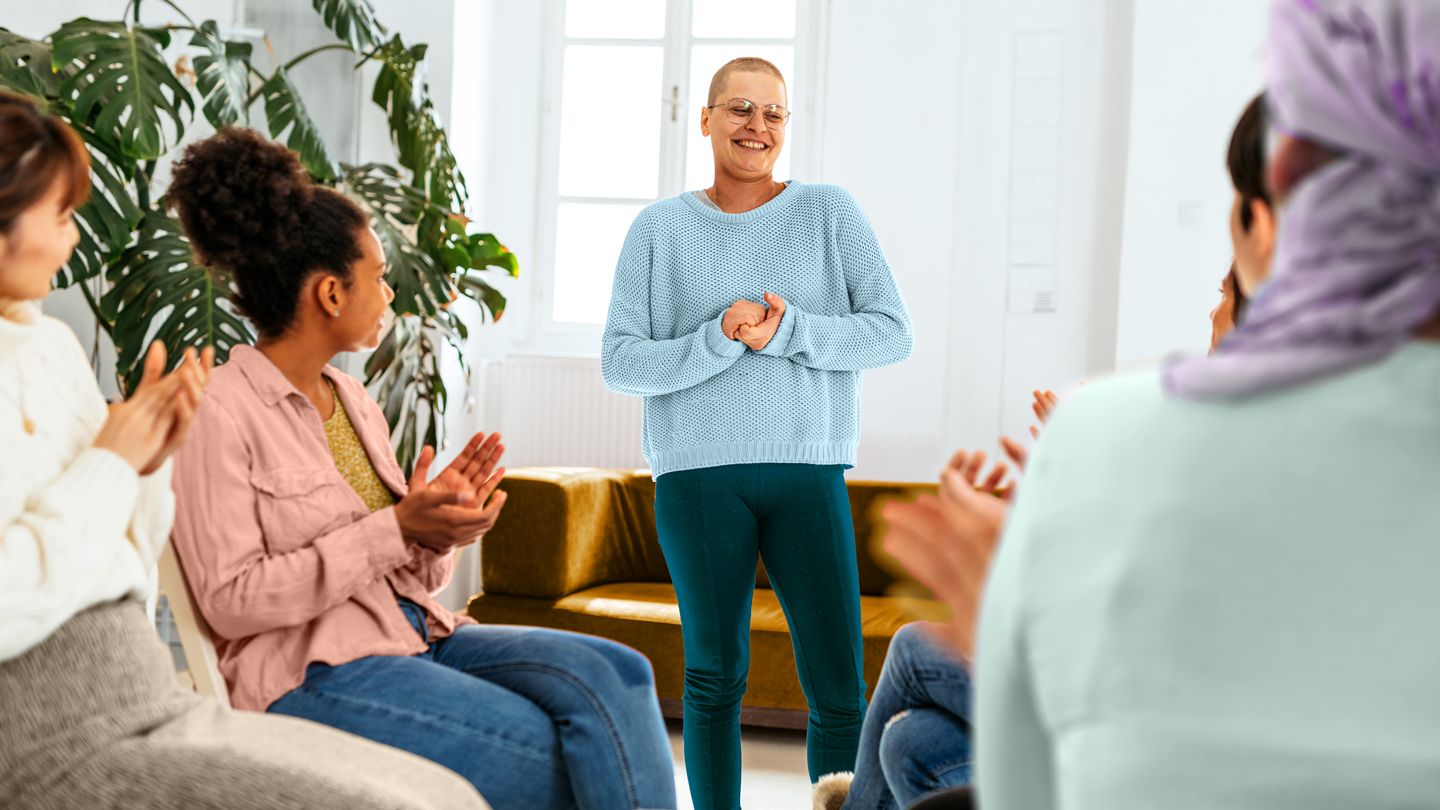Some organizations have made it their mission to help young people with all types of cancer navigate their diagnosis, treatment, and beyond. The following groups offer financial aid and research opportunities, while also aiming to foster meaningful connections through virtual and in-person support groups, one-on-one peer connections, and even adventurous excursions.
1. Cactus Cancer Society
Cactus Cancer Society provides an array of programs and events to suit young survivors and caregivers with different interests. From Lego-building to art and journaling workshops, it strives to banish isolation in young people with cancer. Through its Awkward Auntie initiative, adolescents and young adults with cancer can ask any question they have about relationships and sex that they may feel hesitant to ask a provider in person.
Cactus Cancer Society hosts an annual YA Cancer Gabfest, a weeklong series of discussions and interactive crash courses on facing cancer as a young person. It also offers information on research opportunities focused specifically on young adult cancer survivors.
2. Elephants and Tea
Elephants and Tea is a print and digital magazine curated by and for young adults with cancer. It publishes patient stories and offers guidance on living with cancer in this stage of life. Elephants and Tea also hosts virtual community events, like a weekly happy hour and its Perkatory series, which gives the magazine’s writers a platform to share their stories in the hope that participants will feel less alone in their cancer experience.
The organization offers art workshops, guided yoga, and other wellness programs, as well as support groups for young people with cancer and their loved ones. Elephants and Tea makes an effort to address difficult topics, such as substance abuse and loneliness, and wants all adolescents and young adults with cancer to know that they are not alone. You can subscribe for free to receive a quarterly magazine or weekly email newsletters and register for events on the website.
3. Expect Miracles Foundation’s SAMFund
A cancer diagnosis and its ensuing treatments can get expensive, and money should be the last thing you have to worry about when you’re living with this disease. Expect Miracles Foundation’s SAMFund exists to ease that heavy financial burden.
After surviving cancer twice, Samantha Watson realized that other young adults with cancer needed a solution to their financial issues, and started SAMFund. Twice a year, SAMFund offers two grants: Its financial assistance grant helps young survivors take care of basic living expenses, including paying rent and pursuing higher education, while the family-building grant was created for those who are ready to start a family and are thinking of having children. The grant covers fertility preservation, testing, adoption, and more.
The SamFund has awarded more than 2,500 grants totaling $4 million to help young adults cope with the financial impact of cancer. Applicants must meet specific general and medical criteria. Visit the website to determine your eligibility and get information on how to apply.
4. First Descents
When you go on an outing with First Descents, you’re in for an adventure. This organization provides young adults with cancer or multiple sclerosis, caregivers, and healthcare workers the opportunity to participate in free outdoor excursions, with a goal to improve long-term survivorship through adventure and community.
First Descent’s core programs offer weeklong activities like kayaking, rock climbing, and surfing. During excursions the organization even provides participants with nutritious meals made with an emphasis on whole foods and plant-based options and curated for those living with cancer or MS.
5. Thriving Beyond Breast Cancer
Thriving Beyond Breast Cancer seeks to empower young breast cancer survivors through emotional and financial support, education, and meaningful engagement. Living with cancer, especially at a young age, can be isolating, and Thriving Beyond Breast Cancers provides numerous resources that foster community.
The organization offers free monthly support groups, both in person in Columbus, Ohio, and online, that focus on navigating the challenges of diagnosis and life post treatment. The Thriving Beyond Breast Cancer podcast explores the powerful journeys of young women facing breast cancer, showcasing inspiring stories and valuable insights from individuals at all stages of the disease.
Financial stipends to help cover medical costs are available for young adults in active breast cancer treatment who fall within a moderate income range. Thriving Beyond Breast Cancer also hosts an annual fundraising gala to support financial assistance initiatives and to help further research on the growing young cancer community.
6. Dear Jack Foundation
The Dear Jack Foundation was founded in 2006 by Andrew McMahon, lead singer of the bands Something Corporate and Jack’s Mannequin. Just the year before, doctors diagnosed McMahon with acute lymphocytic leukemia (ALL) at 23. After enduring two rounds of chemotherapy, radiation, and a lifesaving stem cell transplant from his sister, McMahon sought to provide a voice for young adults who have been diagnosed with cancer, and the Dear Jack Foundation was born.
The organization provides a variety of programs to address the physical and emotional needs of young cancer patients and their families. These include Breathe Now retreats, which offer young cancer survivors the opportunity to heal through two to four day getaways that focus on yoga, meditation, hiking, and connecting with others who have gone through similar cancer journeys. And the Dear Jack Foundation’s Life List program uses donations from corporate partners to grant wishes of young adults receiving active cancer treatment. Wishes can include travel, technology, experiences, and home goods, among others.
The Dear Jack Foundation also holds virtual gatherings led by experts to help young people with cancer gain practical tools to enhance communication, set goals, and grow their career.
7. Stupid Cancer
Stupid Cancer aims to end isolation in the young adult cancer community by bringing people together through a common goal: navigating life with cancer. Stupid Cancer’s virtual discussion series digs into different areas of life that can be affected by cancer, from dating and relationships to mental health. The organization also offers both in-person and digital meetups, as well as an extensive library of resources.
At its annual conference, CancerCon, hundreds of young survivors gather to participate in inspiring lectures, illuminating breakout sessions, and fun-filled activities, designed to bring hope and valuable connection to young people living with cancer. You can sign up for the newsletter to stay in the loop on upcoming events.
8. True North Treks
True North Treks is all about connection — with nature, your peers, and yourself. They meet this goal by offering free backpacking and canoeing treks in the wilderness for young survivors and their caregivers. These trips are designed to help you connect with others and learn mindfulness practices for vital self-care.
For those who would rather steer clear of the wild, True North Treks also offers residential retreats in Utah and Wyoming, and online mindfulness classes, with each month focusing on a different intention, such as acceptance, gratitude, and patience.
9. Young Adult Survivors United (YASU)
Young Adult Survivors United (YASU) was founded by Stephanie Samolovitch, who was diagnosed with leukemia at 19 and experienced firsthand the lack of resources specifically catered to young adults with cancer. After getting her master’s degree in social work, she founded YASU with the goal to enhance the quality of life for adolescents and young adults with cancer, as well as their partners and caregivers.
YASU hosts several events throughout the year in the Pittsburgh area. Its annual Wig Out event brings together young people who have been diagnosed with cancer — along with those who haven’t — for an evening of community and fundraising. Members can also participate in the Young Adult Cancer Camp and the YASU Golf Outing. The organization offers in-person and virtual support groups, such as LGBTQ+ Cancer Chats and Self-Love Workshops, as well as monthly social outings, financial assistance grants, and free respite trips through its Rae of Hope program.
10. Young Survival Coalition (YSC)
Young Survival Coalition (YSC) was founded by a group of young women who had each been diagnosed with breast cancer, and all agreed that young people were underrepresented in research, support, and cancer community opportunities. In an effort to close that gap, YSC offers young adults with breast cancer all over the world several programs, such as peer matchmaking, which allows you to talk one-on-one with another young adult living with cancer, and virtual hangouts designed for different communities. They have groups for those who have received a metastatic diagnosis, who identify as LGBTQ+, and more.
If you prefer an in-person meeting, YSC’s Face 2 Face (F2F) networks are sprinkled all over the United States.
The annual YSC Summit gives young survivors the opportunity to surround themselves with support, education, and connection over the course of three days. On top of all the events, YSC also offers educational resources for learning more about your diagnosis and treatment.
The Takeaway
- Cancer cases in adolescents and young adults ages 15 to 39 have been increasing in recent years.
- Many nonprofit organizations offer a variety of resources to help young people with cancer and their families navigate their diagnosis, treatment, and life beyond cancer.
- These resources include support groups, retreats, workshops, and financial support.
Read the full article here




